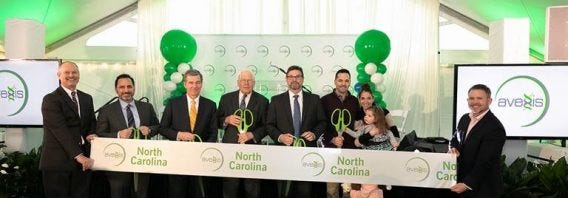
AveXis has opened a gene therapy plant in Durham it says will be able to produce up to seven products simultaneously. President Dave Lennon talks timelines, capacity, and taking production inhouse.
AveXis and its owner Novartis have invested a total of $115 million (€106 million) into a site in Durham, North Carolina to support the production of US Food and Drug Administration (FDA) approved product Zolgensma (onasemnogene abeparvovec) and its pipeline of gene therapy candidates.
With the doors opening last week, we spoke to president Dave Lennon to find out when full production at the site will commence and how this facility fits in with the firm’s wider gene therapy ambitions.

Image: iStock/Milenius
The site is in “a transition process,” Lennon told Frank Vinluan, an Xconomy journalist who visited the facility on behalf of Bioprocess Insider. “We have brought in all the equipment, the raw materials, getting everyone trained to be able to run the process. I just heard today the first cells have arrived that are going to establish the production process here at the site, and that should occur over the next six to eight weeks.”
AveXis will then need to demonstrate to the FDA that the product is stable and effective, and the same as what it produces at its fully operational site in Libertyville, Illinois.
“That process takes us from April to the end of the year,” said Lennon, “and then we’ll submit for licensure and that process can take anywhere from four to 12 months.
“We anticipate it will be on the shorter end because they know there’s interest in the product and having more capacity to supply the market. They don’t want us to have one site either because there’s always the risk that that site has an issue and then we can’t supply the market. That’s not a position the FDA wants us to be in either.”
‘Built with flexibility in mind’
As well as Durham and Libertyville, AveXis recently opened a site in Longmont, Colorado acquired from AstraZeneca last year, a product development facility in San Diego, California, and access to its parent company’s gene therapy capabilities.

Left to right: Jack Kane, AveXis director of Technical Operations & Engineering; Dave Lennon, president of AveXis; Governor Roy Cooper, D-NC; Congressman David Price, D-NC; Rob May, AveXis North Carolina site head; Josh and Kimberly Hewitt, with daughter Cameron, who received AveXis’ gene therapy for Spinal Muscular Atrophy; Ray Lockard, AveXis senior director of Site Quality
“Every site has a different purpose. Our Illinois site was originally purpose built to be the supplying site for the marketplace for Zolgensma. Colorado was acquired for bulk expansion. It’s a big site. We set up the facility differently. We put more bioreactors in one room and it’s really made to produce larger quantities of material in each cycle, production cycle,” Lennon explained.
“The North Carolina site is really built with flexibility in mind. Each of the suites that are out there can run independent product. We can produce up to seven products simultaneously in this facility. That allows us a lot of flexibility to really invest this site into preparation of our pipeline.”
Network changes
Despite the growing internal capacity, there is little chance of AveXis having excess capacity, Lennon said.
“We have so many pipeline assets already in our plan that we’re just waiting for this site to be ready to start producing that material here. I don’t believe we’ll have excess capacity. We already have plans for how we’ll use a lot of the capacity that we have.”
But with the new plants coming online, Lennon contract development and manufacturing organization (CDMO) Paragon Bioservices – now part of Catalent – could be at risk of losing a customer.
AveXis uses Paragon to produce clinical materials for AveXis’ Rett syndrome, Friedreich’s ataxia, and amyotrophic lateral sclerosis (ALS) gene therapy candidates, as well as some clinical and commercial supply of Zolgensma.
“Ultimately, we want to bring all those in house,” said Lennon.
About the Authors
You May Also Like

schedl_b_and_w.jpg?width=100&auto=webp&quality=80&disable=upscale)
schedl_b_and_w.jpg?width=400&auto=webp&quality=80&disable=upscale)



